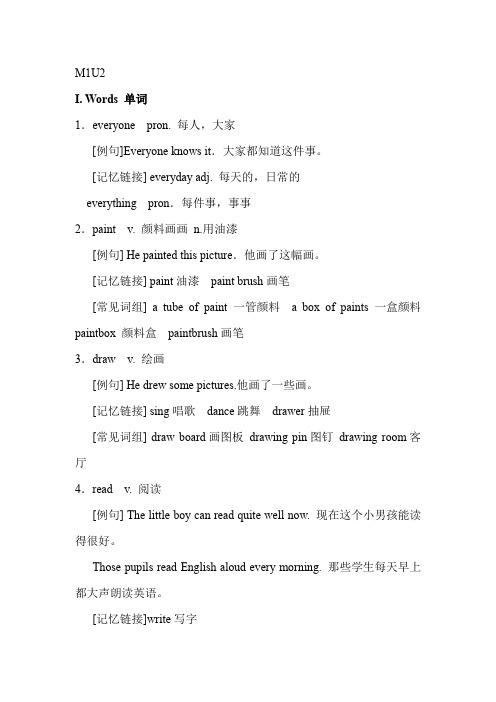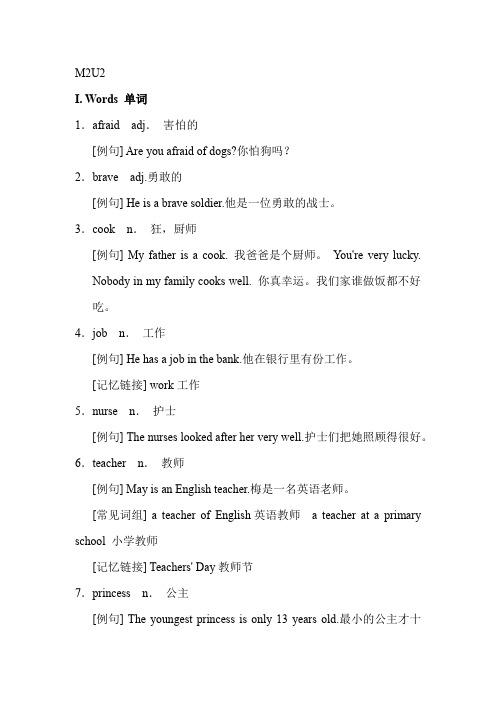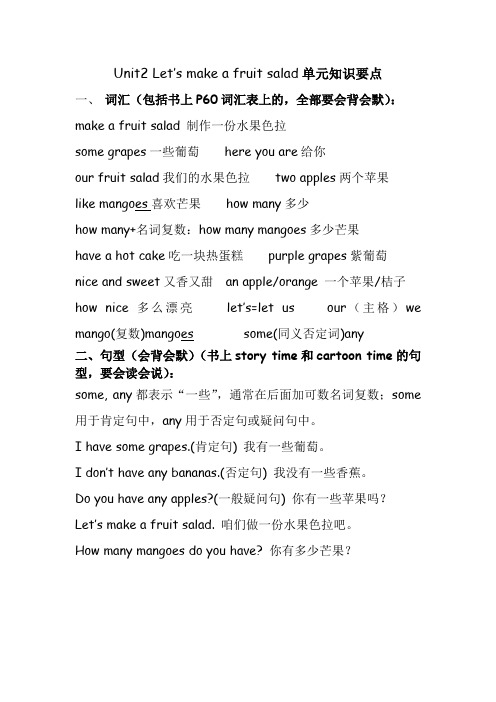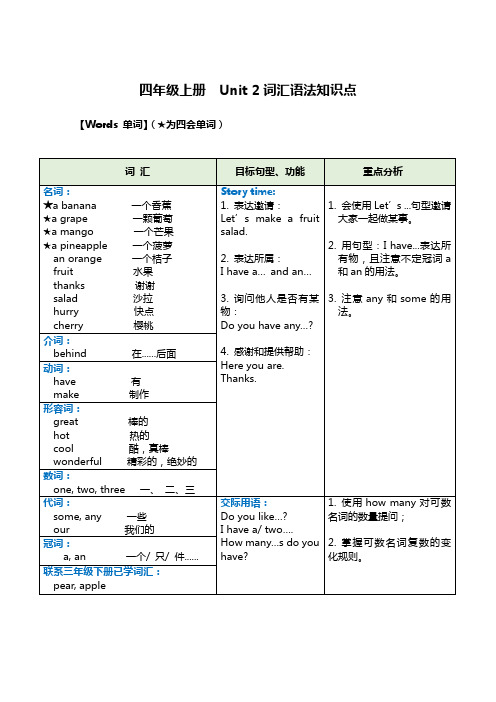四年级上册英语第二单元知识点汇总(牛津版)
- 格式:docx
- 大小:16.31 KB
- 文档页数:5

M1U2I. Words 单词1.everyone pron. 每人,大家[例句]Everyone knows it.大家都知道这件事。
[记忆链接] everyday adj. 每天的,日常的everything pron.每件事,事事2.paint v. 颜料画画n.用油漆[例句] He painted this picture.他画了这幅画。
[记忆链接] paint油漆paint brush画笔[常见词组] a tube of paint 一管颜料 a box of paints 一盒颜料paintbox 颜料盒paintbrush画笔3.draw v. 绘画[例句] He drew some pictures.他画了一些画。
[记忆链接] sing唱歌dance跳舞drawer抽屉[常见词组] draw board画图板drawing pin图钉drawing room客厅4.read v. 阅读[例句] The little boy can read quite well now. 现在这个小男孩能读得很好。
Those pupils read English aloud every morning. 那些学生每天早上都大声朗读英语。
[记忆链接]write写字5.write v. 写,写字[例句] He wrote what he saw. 他写下了他所看到的情况。
[记忆链接] writer作家[常见词组] write out写出6.swim v. 游泳[例句] He can swim well.他游泳游得很好。
[记忆链接] ice hockey冰球breaststroke蛙泳swimmer游泳者swimming游泳swimsuit泳衣[常见词组] go swimming去游泳swim pool游泳池7.jump v. 跳[例句] He jumped the ditch.他跃过了那条沟。
[记忆链接] jumper跳跃者[常见词组] the long jump跳远the high jump跳高jump the queue 插队8.climb v. 爬[例句] The plane climbed steeply.飞机陡直地爬升。

新牛津译林版四年级英语上册各单元知识点汇总(全册)Unit1单元知识四会单词1.like喜欢2.dog狗3.cat猫4.panda熊猫5.hore马6.tiger老虎三会单词1.animal动物2.cute可爱的3.fat胖的4.elephant大象5.lion狮子6.monkey猴子7.have有四会词组1.likedog喜欢狗2.don’tlike不喜欢3.cuteandfat又可爱又胖4.fivehore五匹马5.thattiger那只老虎6.thoepanda那些熊猫7.boyandgirl孩子们8.likecake喜欢蛋糕9.thicat这只猫10.afatcat一只肥猫11.thiblackandwhitepanda这只黑白相间的熊猫12.theebrownmonkey这些棕色的猴子13.atoylion一只玩具狮子三会词组1.theetoyanimal这些玩具动物2.onthemat在垫子上3.haveacake有一块蛋糕4.mylittledog我的小狗5.mybigbag我的大包6.onthelog在原木上7.runwithme和我一起跑四会句型1.Thiiacat.这是一只猫。
Ilikecat.我喜欢猫。
2.Idon’tliketiger.我不喜欢老虎。
ButIlikethattiger.但是我喜欢那只老虎。
3.Doyoulikedog你喜欢狗吗?Ye,Ido.是的,我喜欢。
4.Doyoulikepanda你喜欢熊猫吗?第1页共1页No,Idon’t.不,我不喜欢。
5.Doyoulikeit你喜欢它吗?三会句型1.Lookattheetoyanimal.看看这些玩具动物2.It’cute.它很可爱。
3.They’recuteandfat.它们又可爱又胖。
4.Wouldyoulikeapie你想要一个派吗?No,thank.不要,谢谢。
5.Ihaveacakehere.我这儿有一个蛋糕。

沪教牛津版四年级英语上册全册知识点汇总清单Unit 1: Hello, Friends!- Greetings: Hello, Hi, Good morning, Good afternoon, Goodbye - Introduce oneself: My name is..., I'm ..., I'm from ...- Numbers 1-10- Classroom objects: book, bag, pencil, ruler, rubber, pencil caseUnit 2: At School- Subjects: English, Math, Chinese, Music, Art, P.E.- Action verbs: read, write, draw, sing, dance, jump, runUnit 3: My Family- Family members: father, mother, brother, sister, grandparents- Possessive pronouns: my, your, his, her- Describing family members: tall, short, thin, fatUnit 4: My Home- Rooms in a house: living room, bedroom, kitchen, bathroom- Furniture: sofa, bed, table, chair- Prepositions of place: in, on, under, behindUnit 5: Food and Drinks- Food and drinks vocabulary: noodles, rice, bread, milk, juice, water- Expressing likes and dislikes: I like..., I don't like..., Do you like...?Unit 6: Toys and Games- Toys vocabulary: ball, doll, teddy bear, robot, car- Indoor and outdoor games: hide-and-seek, catch, jump rope, kickball- Expressing preferences: I prefer..., I don't prefer...Unit 7: My Body- Parts of the body: head, eyes, nose, mouth, arms, legs- Action verbs: see, hear, smell, taste, touch, speak, walk, jump- Asking and answering about body parts: What can you see with? I can see with my eyes.Unit 8: Clothes- Clothing vocabulary: T-shirt, dress, skirt, trousers, shoes- Colors: red, blue, yellow, green, orange, purple- Describing clothes: big, small, long, short, new, oldUnit 9: Weather- Weather vocabulary: sunny, rainy, cloudy, windy, snowy- Expressing feelings about weather: I like sunny days. I don't like rainy days.Unit 10: Holidays and Festivals- Holidays and festivals: Christmas, New Year, Spring Festival- Traditional activities: giving presents, fireworks, lion dance- Expressing holiday greetings and wishes: Merry Christmas, Happy New Year, Happy Spring Festival。

I. Words 单词1.afraid adj.害怕的[例句] Are you afraid of dogs?你怕狗吗?2.brave adj.勇敢的[例句] He is a brave soldier.他是一位勇敢的战士。
3.cook n.狂,厨师[例句] My father is a cook. 我爸爸是个厨师。
You're very lucky.Nobody in my family cooks well. 你真幸运。
我们家谁做饭都不好吃。
4.job n.工作[例句] He has a job in the bank.他在银行里有份工作。
[记忆链接] work工作5.nurse n.护士[例句] The nurses looked after her very well.护士们把她照顾得很好。
6.teacher n.教师[例句] May is an English teacher.梅是一名英语老师。
[常见词组] a teacher of English英语教师 a teacher at a primary school 小学教师[记忆链接] Teachers' Day教师节7.princess n.公主[例句] The youngest princess is only 13 years old.最小的公主才十[记忆链接]prince王子8.doctor n.医生[例句] Tom's brother is a doctor.汤姆的哥哥是一名医生。
[常见词组] see a doctor9.bring v.拿来,带来[例句] Mary brings a red kite.玛丽带来一只红色的风筝。
He brought his son with him.他把儿子带来了。
[辨析] bring.take,fetch和carrybring表示带来,take表示带走,fetch表示去取来,carry表示运送,指用车、船、手、扇、背等把人或物运送至另一地。

Unit2 Let’s make a fruit salad单元知识要点
一、词汇(包括书上P60词汇表上的,全部要会背会默):make a fruit salad 制作一份水果色拉
some grapes一些葡萄here you are给你
our fruit salad我们的水果色拉two apples两个苹果
like mangoes喜欢芒果how many多少
how many+名词复数:how many mangoes多少芒果
have a hot cake吃一块热蛋糕purple grapes紫葡萄nice and sweet又香又甜an apple/orange 一个苹果/桔子how nice 多么漂亮let’s=let us our(主格)we mango(复数)mangoes some(同义否定词)any
二、句型(会背会默)(书上story time和cartoon time的句型,要会读会说):
some, any都表示“一些”,通常在后面加可数名词复数;some 用于肯定句中,any用于否定句或疑问句中。
I have some grapes.(肯定句) 我有一些葡萄。
I don’t have any bananas.(否定句) 我没有一些香蕉。
Do you have any apples?(一般疑问句) 你有一些苹果吗?Let’s make a fruit salad. 咱们做一份水果色拉吧。
How many mangoes do you have? 你有多少芒果?。

四年级上册Unit2词汇语法知识点【Words单词】(★为四会单词)语音Grammar语法精讲1.I have a pineapple.我有一个菠萝。
知识点:I have a/an/some...我有一个/一些......主语为第三人称单数时使用has 例句:①I have many toy animals.我有许多玩具动物。
②She has an apple.她有一个苹果。
③They have some crayons.他们有一些蜡笔。
2.Do you have any bananas?你有一些香蕉吗?知识点:have句型的一般疑问句形式为:Do you have...?回答为:Yes,I do./No,I don’t.--Do you have a football?你有一个足球吗?--Yes,I do./No,I don’t.是的,我有。
/不,我没有。
3.Let’s make a fruit salad.我们一起做个水果沙拉吧!(1)知识点:fruit指“水果”时,为集体名词,只用单数。
例句:Do you like fruit?你喜欢吃水果吗?fruit作为个别的水果或是种类时,为可数名词,复数形式为fruits。
例句:I like apples,bananas,pears and other fruits.我喜欢苹果、香蕉、梨子和其它的水果。
(2)知识点:祈使句Let’s...用来建议对方一起做某事,意为“让我们一起......”其肯定回答一般使用:OK./All right./Great./Good idea.例句:--Let’s sing a song!我们一起唱首歌吧!--Good idea!好主意!4.How many mangoes do you have?你有多少个芒果?many许多,后面+可数名词复数,如:many treesmuch许多,后面+不可数名词,如:much waterhow many“多少”,对可数名词复数数量进行提问;how much“多少”,对不可数名词进行提问。
M4U2I. Words 单词1.park n.公园[例句] Jane was willing to accompany you to the park for a walk. 简愿意陪你去公园散步。
[记忆链接] garden花园2.camera n.照相机[例句] I have a camera.我有一个相机。
3.cap n.(有帽舌的)帽子,保护盖[套][例句] Put the cap back on the bottle.把瓶盖盖上。
4.fountain n.喷泉(1) 喷泉[例句] There is a fountain in the centre of the square. 广场中央有一个喷泉。
(2) 源泉[例句] Social life is the fountain of artists’ creation. 社会生活是艺术家创作的源泉。
[常见词组] fountain head源泉,根源fountain pen自来水笔5.beside prep.在……旁边[例句] There’s room beside me.我旁边有空间。
6.map n.地图[例句] This is a map in the scale of one-millionth.这是一张比例尺为1比100万的地图。
7.pond n.池塘[例句] -Where are the ducks?鸭子在哪里?-They are in the pond.它們在池塘里。
[记忆链接] pond lily睡莲pondage蓄水量8.sketchbook n.写生簿,素描簿[例句] Hand in your sketch book.交上你的草图本。
Where is your sketch book, Mary? 玛丽,你的素描本在哪儿?[同义词] sketch-block 写生簿,素描簿9.sleep v.睡觉[例句] He had only a brief sleep that night. 那天晚上他只睡了一会儿。
Unit2 知识点汇总单词:fruit (水果)pineapple(s) 菠萝Let’s 咱们=Let usmango(es)芒果make 做,制作banana(s)香蕉salad(s) 色拉grape(s)葡萄any 一些,任何的apple(s)苹果(an) some一些pear(s)梨our 我们的watermelon(s)西瓜cool酷,真棒orange(s)橘子,橙子(an) how many 多少(对数量的提问)cherry(cherries)樱桃wonderful 精彩的短语:have a pineapple有一个菠萝some mangoes 一些芒果make a fruit salad 做一份水果色拉like apples喜欢苹果how many mangoes 多少个芒果our fruit salad 我们的水果色拉how nice 好漂亮here you are 给你a hot cake一块热蛋糕please hurry请快点purple grapes紫色的葡萄nice and sweet 好看又甜句型:1.Do you have a∕an∕any…你有一个∕一些…Yes,I do /No, I don’t2.Here you are给你。
Thanks=thank you3.Let’s make …让我们一起做……Great!/All right ! 好的!4.How many+可数名词复数do you have?(how many 是对数量多少的提问),其答语为:I have…我有…5.They’re nice and sweet. 它们又好看又甜。
语法知识:1、Let’s 常用来提出建议,意思是“我们……吧”。
如:Let’s go and play football.2、some与any的使用相同点:some和any都可以表示“一些”;不同点:some用于肯定句和希望得到肯定回答的、表示邀请、请求的问句,如:I have some purple grapes. Would you like some apples?any一般用于否定句和疑问句,如:Do you have any dogs? I don’t have any mangoes.(进入高年级后会更加全面的总结some与any的用法)3、have的使用(1)have表示“有”(2)have表示“吃、喝”,如:have a cake with a cherry, have milk。
I. Words 单词1.afraid adj.害怕的[例句] Are you afraid of dogs?你怕狗吗?2.brave adj.勇敢的[例句] He is a brave soldier.他是一位勇敢的战士。
3.cook n.狂,厨师[例句] My father is a cook. 我爸爸是个厨师。
You're very lucky.Nobody in my family cooks well. 你真幸运。
我们家谁做饭都不好吃。
4.job n.工作[例句] He has a job in the bank.他在银行里有份工作。
[记忆链接] work工作5.nurse n.护士[例句] The nurses looked after her very well.护士们把她照顾得很好。
6.teacher n.教师[例句] May is an English teacher.梅是一名英语老师。
[常见词组] a teacher of English英语教师 a teacher at a primary school 小学教师[记忆链接] Teachers' Day教师节7.princess n.公主[例句] The youngest princess is only 13 years old.最小的公主才十[记忆链接]prince王子8.doctor n.医生[例句] Tom's brother is a doctor.汤姆的哥哥是一名医生。
[常见词组] see a doctor9.bring v.拿来,带来[例句] Mary brings a red kite.玛丽带来一只红色的风筝。
He brought his son with him.他把儿子带来了。
[辨析] bring.take,fetch和carrybring表示带来,take表示带走,fetch表示去取来,carry表示运送,指用车、船、手、扇、背等把人或物运送至另一地。
4A Tips for M3U2Class_______ Name_________ No. ____ Signature_______一、单词/词组二、新句子1. Where is your home, Jill? It’s at No. 126, Garden Street.吉尔,你的家在哪里?我的家在花园街126号。
2. What’s near your home? There is a supermarket and some shops there.你家附近有什么?那儿有一个超市和一些商店。
3. Is there a park near your home? Yes, there is.你家附近有公园吗?有的。
4. Are there any shops ? No, there aren’t. 那有些商店吗?不,没有。
5. What do you want to do? I want to send a postcard.你想要什么?我想要寄一张明信片。
6. -Thank you so much, girls. 女孩们,非常感谢。
-It’s our pleasure. 不客气。
7.-What can they do? 他们可以干什么?-They can buy clothes, clocks and many other things.他们可以买衣服、钟以及许多其他的东西。
-They can also eat in the restaurants or stay in the hotels.他们也可以去饭店吃东西或者待在宾馆里面。
三. 语法知识方位词的使用in front of There is a dog in front of the box.There is a dog behind the box. behindbeside= next toThere is a dog beside the box.There is a dog next to the box. beside/next to 表示“在…旁边、紧挨着”nearThere is a dog near the box.near 表示“在…附近”(离物体有一段距离)over There is a dog over the river.over表示“在…上方”(与物体不接触)betweenThere is a dog between two boxes. There is a dog between box A and box B.between表示两者之间amongThere is a dog among four boxes.among表示三者或三者以上之间backfrontA Bbackfront。
四年级上册英语第二单元知识点汇总
(牛津版)
词汇:
schoolbag书包
mathsbook
数学书
Englishbook英语书
toy玩具
chinesebook语文书
storybook故事书
candy糖果
notebook笔记本
key
钥匙
lost
丢失
cute
可爱的
somuch非常地
pencil
pen
book
ruler
pencil-case
铅笔
钢笔
书本
尺子
铅笔盒
句型:
、what’sinyourschoolbag?你的书包里有什么?
AnEnglishbook、achinesebook、amathsbookandthreestorybooks.
有一本英语书、一本语文书、一本
数学书和三本故事书。
Threekeys、twotoysandanEnglishbook三把钥匙、两个玩具和一本英语书。
2、Ihaveanewschoolbag.我有一个新书包。
whatcolourisit?它是什么颜色的。
It’sblackandwhite.它是黑色和白色的。
3、Excuseme.对不起、打扰一下、
Ilostmyschoolbag我的书包弄丢了。
4、Hereitis=Hereyouare给你。
Thankyousomuch.非常感谢。
5、myschoolbagisheavy.我的书包太重了。
6、what’sinyourhand?你的手里有什么?
Aruler?一把尺子吗?No,it’saneraser.
不,它是一块橡皮擦。
重点语法知识点:
、问路时要用"excuseme对不起,打扰一下"
2、描述路时可以用顺序词:first首先,next接着,then然后
3、near表示在附近,nextto表示与…相邻。
它的范围比near小。
infrontof在。
前面behind在……后面
4、在左边,在右边介词要用on,ontheleft/ontheright,但是东西南北,介词要用in,inthenorth/east/south/west.
5、for表示持续多长时间,当表示做某事多长时间都要用for.?如:walkeastfor5minutes.??Thenwalkstraightforthreeminut es.
6、乘几路车可以用bytheNo.301bus,注意No.中N要大写,后面要加点。
如果要用动词可以用take,例如taketheNo.301bus.
7、当表示某个地方在另一个地方的哪一方向时,要用介词of。
如:thehospitaliseastofthecinema.医院在电影院的东边。
8、表示在哪儿转时,用介词at。
如:Turnleftatthebank。
在银行左转。
9、find表示"找到",强调找的结果。
Lookfor表示"寻找",强调找的过程。
0、在几点前面要用介词at,如at7p.m.
1、英文的书信与中文的书信不完全一样:
开头:英语是在人称后面加逗号,中文是加冒号。
正文:英语是空三个或者五个字母写,中文要空两个中文字格。
结尾:英语的落款与人名是顶格而且是分开写的。
中文则是另起一行,放在一起且稍靠后一点儿的地方。
英文名字的书写要注意下。
2、近义词:
bookstore==bookshop书店gostraight==godown直行afterschool==afterclass放学后
3、反义词或对应词:
here---thereeast---westnorth---south
left---rightgeton---getoff
4、inthefrontof…表示在…的前面,是指在该地方的范围内,infrontof而则表示在该地方的范围外。
如:infrontofourclassroom是指在教室的外面而且在教室的前面。
而inthefrontofclassroom则是指在教室里的前面。
5.befarfrom…表示离某地远。
be可以是am,is,are. myhomeisnotfarfromschool.我家离学校不远。